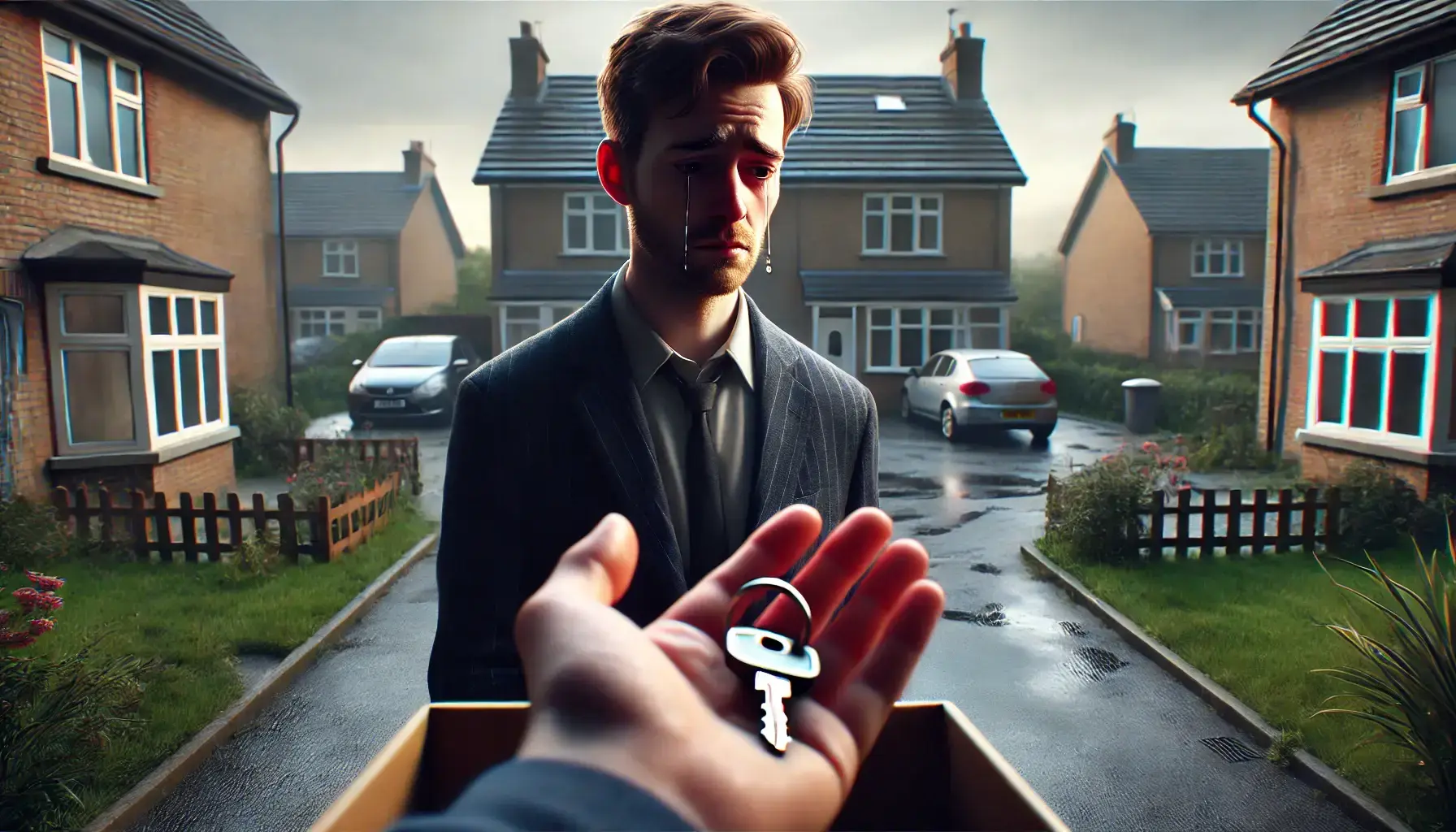Can I Lose My House Due to An At-Fault Car Accident?

Legally reviewed by:
Daniel Smith December 17, 2024
If you’re ever responsible for a car accident, you will likely face financial liabilities. In many cases, these damages could be significantly damaging, especially when you have to bear them alone.
One common question people have is whether their home—often their most valuable asset—is at risk after an at-fault car accident. And while losing your house is unlikely in most cases, it’s not impossible.
The outcome depends on factors like your insurance coverage, the extent of the damages, and the legal protections in your state. In this article, we’ll explore the risks, protections, and steps you can take to safeguard your home and other assets after an at-fault car accident.
Liability Coverage and Damages
When you’re at fault for a car accident, the financial responsibility for damages typically falls on you. This includes compensation for medical bills, vehicle repairs, and other losses suffered by the victim.
Fortunately, most drivers have auto insurance policies with state-law mandated liability coverage designed to cover these costs. However, the extent to which your insurance protects you depends on your policy limits and the severity of the damages.
Understanding Liability Coverage
Liability insurance covers two main categories: bodily injury and property damage. Bodily injury liability pays for the other party's medical expenses, lost wages, and pain and suffering. On the other hand, property damage liability covers repairs to the other party’s vehicle or property.
Most states require a minimum liability coverage which has different limits depending on state law. In Missouri, for instance, Mo. Rev. Stat. § 303.190 specifies the state limits to be $25,000 for bodily injury to one person, $50,0000 for bodily injury or death to two or more people, and $25,000 for property damage.
But in Pennsylvania, the minimum liability coverage has to provide $15,000 for bodily injury to one person, $30,000 for bodily injury to two or more people, and $5,000 for property damage according to 75 Pa. Cons. Stat. § 1702. Naturally, most drivers opt for the minimum required policy, but it could be insufficient to cover all the damages a liable driver has to pay after an accident.
For example, if your policy covers $50,000 for bodily injury per person and $25,000 for property damage, but the victim’s medical bills alone exceed $100,000, you could be personally responsible for the remaining $50,000. In such cases, the victim may pursue your personal assets to cover the gap.
When Insurance Isn’t Enough
If the damages exceed your policy limits, the injured party can file a lawsuit against you to recover the remaining amount. If they win the case, the court may issue a judgment requiring you to pay the outstanding balance.
This is where your personal assets, including your home, could potentially come into play.
How to Protect Your Assets

While the thought of losing your home is alarming, there are several steps you can take to protect your assets before and after an at-fault car accident. Proactive measures can provide an additional layer of security against financial vulnerability.
Increase Your Insurance Coverage
One of the best ways to protect your assets is to ensure you have sufficient liability coverage. Review your auto insurance policy and consider increasing your coverage limits if they are too low. While higher limits may result in slightly higher premiums, they provide much-needed protection in case of a severe accident.
You might also want to purchase an umbrella insurance policy. Umbrella insurance provides extra liability coverage that kicks in when your primary policy limits are exhausted. This type of policy can cover substantial damages and offer peace of mind.
Understand Your State’s Laws
Asset protection varies by state due to differences in laws regarding judgments and asset exemptions. For example, some states have “homestead exemptions” that protect a portion of your home’s value from creditors.
Separate and Protect Your Assets
If you have significant assets, consider separating them to reduce exposure. For example, transferring non-essential properties or investments to a well-structured irrevocable trust can shield them from potential creditors.
If your assets are also owned by another party like a family member or an LLC, it may be possible to protect them from creditors. However, it is important to remember that taking actions like transferring ownership of your assets specifically to avoid paying a creditor will be considered fraud, and may lead to a criminal charge.
Consult with an estate planning attorney or financial advisor to determine the best strategy for protecting your assets.
Seek Legal Representation
If you are sued after an accident, hiring an experienced attorney is crucial. A lawyer can help negotiate settlements, reduce potential judgments, and guide you through the legal process. In many cases, a settlement agreement can be reached, preventing the need to sell personal assets.
Act Promptly
Delaying action after an accident or lawsuit can worsen your financial situation. Respond promptly to all legal notices, cooperate with your insurance company, and follow your lawyer’s advice to minimize the risk of losing assets.
How Does Your House Play into This?
Your home is a significant asset, and understanding how it factors into liability judgments is essential. The risk of losing your house depends on several variables, including the size of the judgment, your state’s homestead laws, and the nature of your ownership.
The following factors are important to consider before deciding if you may lose your home to judgement creditors.
Homestead Exemption
Many states have homestead exemption that protect a portion or all of your home’s value from creditors. These exemptions vary widely:
Unlimited exemptions
Florida’s Fla. Const. art. X, § 4, as an example, expressly provides that homestead properties spanning 160 acres of land in an unincorporated county or a half-acre in a municipality, that property will be exempt from any forced sale, even if it arises from a judgement.
However, to qualify for this protection you must own the property in your name and live on it as your primary address.
Texas (Tex. Prop. Code ch. 41) and some other states also have similar laws that prevent the primary residence of a person from being sold by judgement creditors. However, even if you are in a state that offers unlimited homestead protection, it is still crucial to make sure your property meets the requirements.
Limited exemptions
Some other states offer protection only up to an extent on a potential homestead recovery by a judgement creditor.
In California, for instance, Cal. Civ. Code § 704.730 provides that a homestead exemption will be the greater of the countywide median sale price for a single family home not exceeding $600,000 or $300,000. This means that the greater of either of those amounts which form a part of a home’s equity will be protected against being sold.
In Connecticut, Conn. Gen. Stat. § 52-352b provides that a homestead to the value of $75,000 will be exempt from money judgements.
Minimal or no exemptions
In states with minimal or no homestead protections, like New Jersey and Pennsylvania, more of your home’s value may be vulnerable to a judgment.
Equity in Your Home
The equity you have in your home also affects its vulnerability. Equity is the difference between your home’s market value and any outstanding mortgage balance. If your home has substantial equity and limited homestead protection, creditors may target it to satisfy a judgment.
Judgment Liens
When a court awards a judgment against you, the creditor can place a lien on your property. A lien does not force you to sell your home immediately, but it can make it difficult to refinance or sell the property without satisfying the debt. In some cases, creditors may pursue foreclosure to recover their money, though this is less common.
Joint Ownership and Marital Property
If you own your home jointly with another person, such as a spouse, the risk may be reduced. Many states have “tenancy by the entirety” laws that protect jointly owned properties from being used to satisfy individual debts. However, this protection does not apply in all states, so it’s essential to understand your state’s property laws.
How The Accident Helpers Can Help
While the possibility of losing your home due to an at-fault car accident is rare, it’s not entirely out of the question. The best way to protect your home and other assets after an accident is to immediately consult with a legal or financial professional to create a tailored asset protection plan.
This is where we come in. At The Accident Helpers we can connect you with a reliable lawyer in your area who understands how to protect your home, assets, and overall financial well-being.
These skilled attorneys can assist with every aspect of dealing with an accident, from negotiating with insurance companies to challenging accusations of fault in court. They can also help you explore asset protection options, such as utilizing homestead exemptions or setting up trusts, and ensure that your legal rights are upheld throughout the process.
Finding the right attorney can be a daunting task, but at The Accident Helpers, we make it easy. Best of all, our services are completely free, allowing you to focus on what matters most—recovering and protecting your future.
Contact us today to get started!




